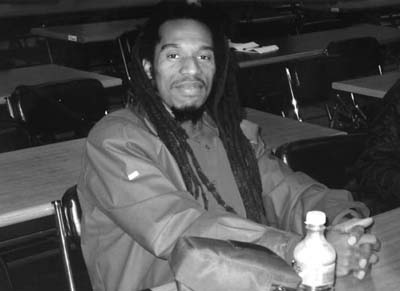Benjamin Zephaniah Performs Poetry At Ewha

De tongue fires a riddim dat shoots like shots..."
From "Dis Poetry" by Benjamin Zephaniah
"To me, poetry is not about cleverness. It"s not just words. Poetry is passion, and it means trying to reach out and say something," says the poet Benjamin Zephaniah. His thick dreadlocks that come down to his waist catch attention, yet, his appearance does not reveal that he is a poet. Reggae poet, rap poet, and street poet: the titles people apply to this man are endless. He replies, however, that above all these things, he is a ?erformance poet.
Invited by the British Council of Korea, Zephaniah held a poetry performance at Ewha on November 12. Zephaniah is a widely renowned poet and writer from England, but his poetry is influenced by Jamaican culture. He strongly believes in the value of oral poetry not simply writing the words down, but performing poetry in front of an audience an experience he shared with Ewhaians during his stay in Korea.
"I like to travel around the world and visit places that have cultural importance, where the oral tradition is still alive," Zephaniah says. He mentions that he enjoys performing in African and Asian countries and adds, "In these places, people don"t ask you what you"ve published. If you say you write poems, they invite you to stand up in front of the room and "do one."".
Found to be dyslexic as a child, Zephaniah finished his education when he was 13, and was 21 when he learned to read and write. One of the reasons he likes to perform his poetry is because he can reach people whether they are literate or not. Asked about what goes inside his mind when he is performing a poem, he replies, "I remember the emotion I felt when I wrote it." Conveying that emotion is his ultimate aim he adds, ? "I look at the faces in the audience and at certain points, clench my fists or move my arms in a particular way that better explains what I feel."
His sense of humor is certainly an attribute of his charm. While performing his poem, "White Comedy," a short comical satire of the English language and the notion of political correctness, Zephaniah sprinkled the performance with jokes and gestures that set the audience chuckling every five seconds. Or, as he told the audience how he got the idea for writing his poem, "Macho-man," he mentioned the time his conservative father admonished him by saying, "Son, when you grow up, you must be a man." The rebellious son replied, "Well, Dad, do I have a choice?"
Humor is just one of the dominant aspects of Zephaniah"s works, however. Other poems are quite serious, as can be seen in "What Stephan Laurence Taught Us," a poem based on a true criminal case that remains unresolved to this day of a black boy who was killed by white men in Britain. Zephaniah repeats in his poem the phrase, "We know who the killers are" and builds up a feeling of rage at injustice that can only be felt by hearing his powerful voice. "The Wrong Radio" is also a significantly critical poem that attacks the influence of the media by continuously stressing, in anguished tones, that, "I"ve been listening to the wrong radio." His voice changes from loud to soft, from angry to tender, but never without the deepest emotion.
"People want to hear about today, about what"s going on in the streets right now," says Zephaniah, explaining that he is a political poet. He also states that the most difficult part of being a poet is the pressure not to repeat himself. "There are some issues in the world, like apartheid, for example, that can"t be finished with one poem. So I try to look at it from a different angle when I write about it again."
On recent global events that seem to prove the theory of a "clash of civilizations," he states his opinion that, "There"s a lack of understanding. Although all the countries say that God is on their side, God is not here to answer. There"s an even bigger divide now, and I think that Western capitalism needs enemies". His wish to "do away with all armies" shows his hate of wars and his yearning for harmony.
Closing his poetry performance at Ewha, he concluded with simple but effective words to the audience, "Iwant you to go out there, and increase the peace."
ejc1282@ewha.ac.kr
Ewha Voice
evoice@ewha.ac.kr

